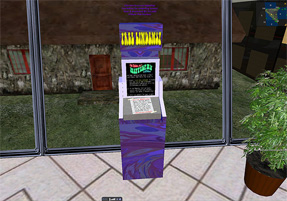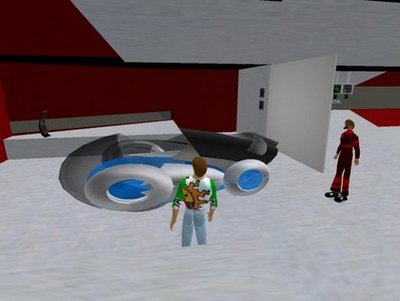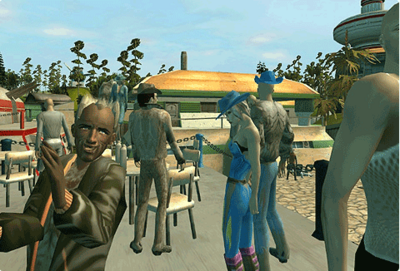Category: Virtual Reality
VWFE: What's the future for virtual worlds?
Phew. We’re at the final session of the Virtual Worlds Forum Europe conference, and my head is spinning from all the ideas buzzing around from the last two days. The final panel should provide a few more, since it’s focused on The Future. Where is all this going, and what will it mean for us punters?
We’re just getting the first William Gibson quote of the session. Who had 5.6 seconds in the sweepstake? Marvellous. First up, the panellists are going to introduce themselves. Professor Richard Bartle from the University of Essex says he co-wrote the first virtual world in 1978. “That’s all I need to say really.”
VWFE: The legal pitfalls of virtual worlds
 Oh my. I’m at the Virtual Worlds Forum Europe still, and it’s about to get hardcore in a legal eagly way. The next panel session is ‘Legal and regulatory issues relating to virtual worlds’. In other words, can you get your avatar arse sued or arrested for something you do in virtualand?
Oh my. I’m at the Virtual Worlds Forum Europe still, and it’s about to get hardcore in a legal eagly way. The next panel session is ‘Legal and regulatory issues relating to virtual worlds’. In other words, can you get your avatar arse sued or arrested for something you do in virtualand?
First up is David Naylor, partner in the technology law group at Field Fisher Waterhouse, which actually has a Second Life office. He says the legal issues range from what exactly an in-world asset is, and who actually owns it (you, or the company that runs the virtual world).
VWFE: Spotlight on five hot new virtual worlds

This is one of the sessions at the Virtual Worlds Forum Europe that I’ve most been looking forward to: five new virtual worlds pitching their wares, or at least introducing themselves. It should be a glimpse at the next generation of virtual worlds, and a chance to see where all this is heading.
So, we start with…
1. HiPiHi (link)
It’s pronounced High-Pee-High by the way, and has been tagged as ‘the Chinese Second Life’, being based in Beijing. “Previously, there’s been no virtual world that’s really catered for the Chinese market and targeted their language barriers,” says presenter Bjorn Lee. “Our vision is to create a virtual world and virtual economy.”
VWFE: How do virtual worlds make money anyway?
Right, time for a panel session at Virtual Worlds Forum Europe, on business models. In other words, where’s the dosh coming from? Moderator Corey Bridges of The Multiverse Network is kicking things off by saying virtual world companies can learn a lot from games like World of Warcraft and Lineage, because they’re making shedloads of money (I paraphrase, obviously).
Thomas Bidaux from NCSoft Europe is first up, and they make massively multiplayer online games (MMOGs), so he should know that area well (Lineage and Guild Wars are among their games). The company’s most common model is subscription, where people pay a monthly fee to play a game.
VWFE: IBM on why virtual worlds need to be interoperable
 up at the Virtual Worlds Forum Europe is Paul Ledak, who’s one of IBM’s virtual world gurus. He’s explaining the important (if you’re in the virtual worlds business) of interoperability.
up at the Virtual Worlds Forum Europe is Paul Ledak, who’s one of IBM’s virtual world gurus. He’s explaining the important (if you’re in the virtual worlds business) of interoperability.
He’s kicking off with a personal example: creating a house in a virtual world, with an eye to building it in real life (I think). So, you start with a 2D floorplan design, and have to turn that into a 3D form – maybe via an architect who visualises it for you, in partnership with an interior designer. “At the end of the day, there are many different people involved in putting this together.”
VWFE: BP on how businesses can make the most of virtual worlds
 It’s the second day of the Virtual Worlds Forum Europe conference, so I’m here reporting on all the discussion and debate. There’s a fair amount of sessions on corporate and legal issues today, but also some exciting stuff on new virtual worlds, and the future. Sorry, The Future.
It’s the second day of the Virtual Worlds Forum Europe conference, so I’m here reporting on all the discussion and debate. There’s a fair amount of sessions on corporate and legal issues today, but also some exciting stuff on new virtual worlds, and the future. Sorry, The Future.
First up is Joe Little from BP, who’s talking about ‘evangelising virtual worlds within the corporation’. In other words, convincing your boss why he shouldn’t be scared of Second Life. Apparently BP is gearing up to make the most of the 3D Web / metaverses (they’re still deciding what term to use) next year.
VWFE: Live-blogging 'the future is blurred: social networking meets virtual worlds'
 Now this is the panel we’ve all been waiting for! Featuring Meg Pickard from The Guardian, Corey Bridges the Co-founder of The Multiverse Network, Aleks Krotoski from The Guardian Games Blog, Cory Doctorow from Boing Boing, and Giff Constable from the software business unit at the Electric Sheep company.
Now this is the panel we’ve all been waiting for! Featuring Meg Pickard from The Guardian, Corey Bridges the Co-founder of The Multiverse Network, Aleks Krotoski from The Guardian Games Blog, Cory Doctorow from Boing Boing, and Giff Constable from the software business unit at the Electric Sheep company.
First question out of the gate is whether social networking sites are any different to virtual worlds. Meg Pickard claims that it’s pretty much the same thing, “they’re exploring, they’re creating, they’re dominating or trying to succeed”, and above all, engaging with other users or friends.
Aleks Krotoski, who is also doing a PhD in virtual worlds, also agrees with Meg, but says the only real difference is that social networking sites generally connects people who know each other already offline, whereas…
VWFE: Live-blogging 'From e-tail to v-business: are virtual goods an entirely new category?'
 Virtual worlds thrive on money, after all, it’s what keeps the servers running, and the gamers happy. But how does a company create revenue, through sales of virtual goods? How can this sector continue to grow, when sites like Facebook have seen free gifts application hacks made available, so paid-for gifts are no longer necessary?
Virtual worlds thrive on money, after all, it’s what keeps the servers running, and the gamers happy. But how does a company create revenue, through sales of virtual goods? How can this sector continue to grow, when sites like Facebook have seen free gifts application hacks made available, so paid-for gifts are no longer necessary?
These questions, and more, are due to be asked in the upcoming panel, where the Senior Editor at Harvard Business Review, Paul Hemp, Professor Michael Hulme from the Centre for Study of Media, Technology & Culture, David Orban CEO of Questar, Mat Small, CEO and Founder of Millions of Us, and Peter Edward, Director at Home Platform Group for Sony Computer Entertainment will attempt to answer this questions.
Adam Pasick is once again moderating this panel, and asks Peter from SCEE about their virtual goods use within the Home Platform. He explains that virtual goods allow you to decorate your avatar, show your…
VWFE: Live-blogging 'In-world or off-message: what are the brand challenges in virtual worlds?'
 This panel is once again moderated by Adam Pasick, Reuters Bureau Chief at Second Life, and features Daan Josephus Jitta, Direct Channels and Innovation, at ABN AMRO, and Marco van Veen, Manager, Web, Innovation & Collaboration Center, for Heineken.
This panel is once again moderated by Adam Pasick, Reuters Bureau Chief at Second Life, and features Daan Josephus Jitta, Direct Channels and Innovation, at ABN AMRO, and Marco van Veen, Manager, Web, Innovation & Collaboration Center, for Heineken.
Marco van Veen takes the stage first, and begins by admitting they don’t have a virtual world, however they are looking at featuring in virtual worlds, through advertising. Obviously being a beer manufacturer, he says they still have a responsibility to ensure minors aren’t targeted by their…
VWFE: Live-blogging 'Kidalicious: are kids and teenagers the future for virtual worlds?'

Ooh! Ooh! The good one we’ve all been looking forward to today. Alice Taylor, Commissioning Editor at Education at Channel 4, plus woman behind the brilliant Wonderland gamer blog, is on this panel, as is Michael Smith, the CEO and Founder of MindCandy, who are here today promoting Moshi Monsters.
Timo Soininen, CEO at Sulake and Habbo, Mark William Hansen from the Lego Universe, Mattias Mikshe, CEO of Stardoll and Marc Goodchild, Head of Interactive and On-Demand at BBC Children’s make up the rest of the panel, which is moderated by Adam Pasick, the Reuters Bureau Chief at Second Life.
Money made within games created for children is mentioned, and whether it’s worth adding a fiscal element to games. Someone on the panel argues that this is the first generation being hit with the wave of virtual games, and they’ll grow up accustomed…



















